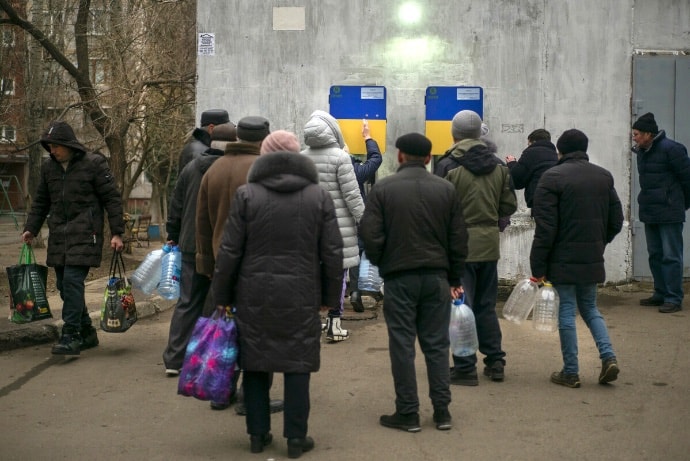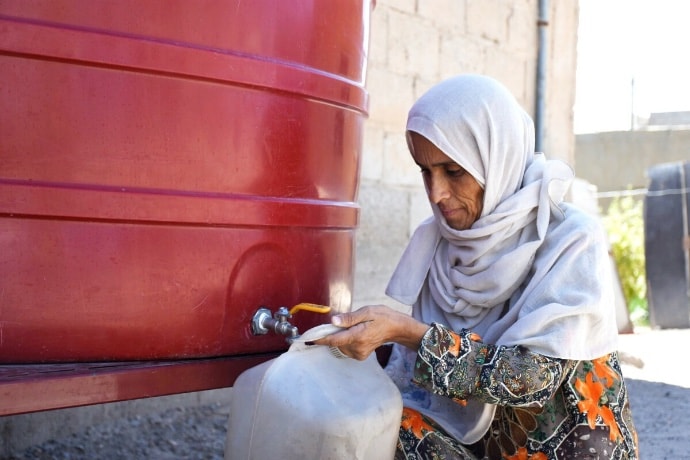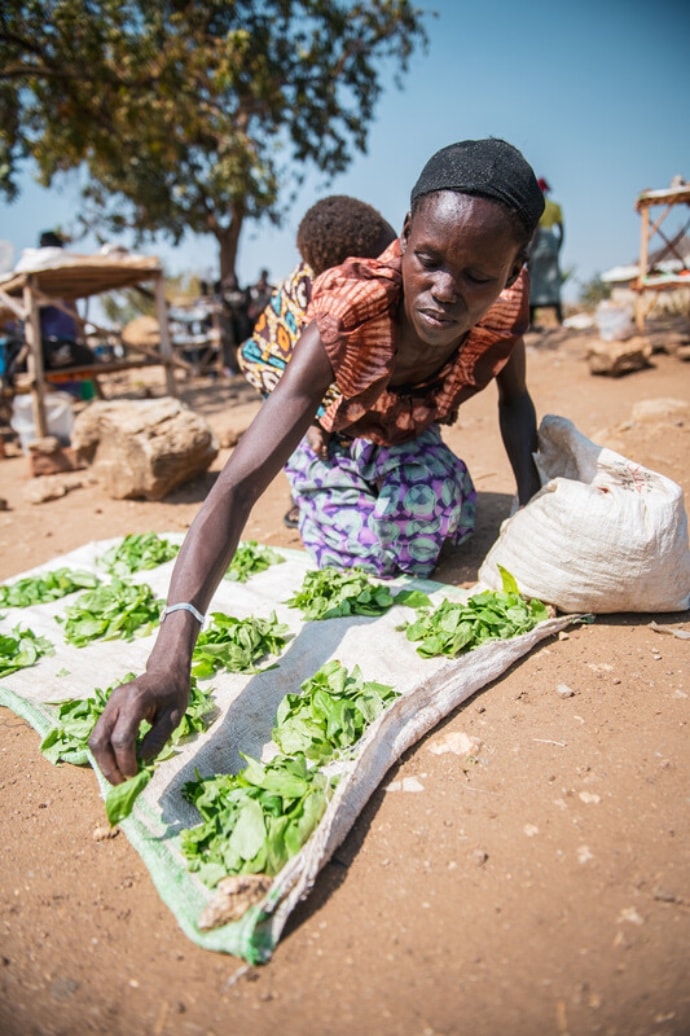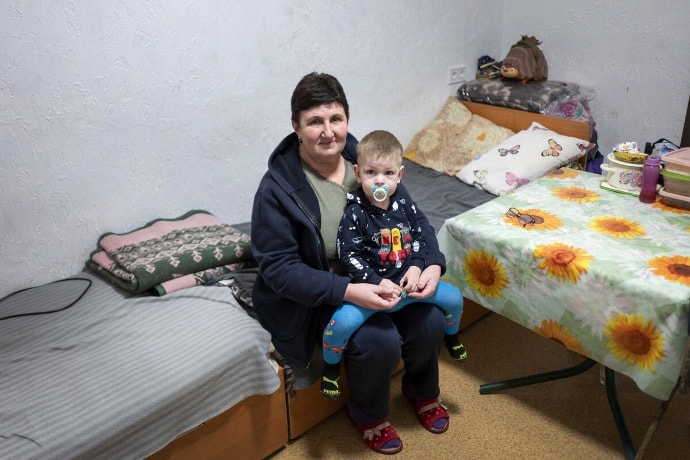By Joel Meyers

Ukraine Oxfam water points in Mykolaiv. Photo: Kieran Doherty / Oxfam
Hello, please introduce yourself, including your position(s) at Oxfam, and where you are stationed.
My name is Tara Gingerich. I am the Humanitarian Director at Oxfam America. Oxfam America is headquartered in Boston, though I live in Maine and work remotely. I have worked for Oxfam for over 15 years.
Tell us a bit about Oxfam and how Oxfam initiated programs to help refugees…
Oxfam is a global organization that fights inequality to end poverty and injustice. We work with local organizations to address urgent humanitarian needs and protect lives when disaster strikes, and at the same time, we tackle the root causes of poverty, for the long term. We advocate for economic justice, gender equality, climate action, and to transform the global humanitarian system. And we demand equal rights and equal treatment so that everyone can thrive, not just survive.
Oxfam’s creation was actually tied to supporting refugees. We were founded in 1942 – as the Oxford Committee for Famine Relief (eventually shortened to its postal code abbreviation “Oxfam”) – in order to support refugees in Greece.
Although the organization is not dedicated exclusively to supporting displaced persons, displacement puts people in such a vulnerable context that they are a significant priority of our humanitarian work.
What are some of the key programs that Oxfam implements to help refugees?
Oxfam partners with local organizations to help refugees and other displaced people around the world with their immediate basic needs as well as advocate for their long-term wellbeing—both in their own nations, and in the countries that host them. We engage with allies and government officials at all levels to focus on peace and find sustainable solutions to the conflict and violence that ruin so many lives. We push for wealthy countries to welcome refugees and generously attend to their needs. And we advocate for public policies that protect the rights of displaced families as they strive to rebuild their lives and fight to provide for their children a more equal future—in their own countries or the ones in which they settle.
Oxfam supports both displaced people who remain within their own countries (“internally displaced persons,” or IDPs) and those who have crossed into another country as they seek safety and security (“refugees”).
Our humanitarian programming for both groups of displaced people tends to be in the major areas, or sectors, in which Oxfam has expertise: water, sanitation, and hygiene; food and economic security, including livelihoods; and “protection,” which is a catch-all term for activities that keep people safe from harm in crisis contexts. Examples of our work include providing clean, safe water; building latrines; providing people with cash to purchase food or, if there is no food available in a community, providing actual food; providing them with training to help find work in their new environment; and helping people to access services for everything from legal advice about their rights to care and justice following gender-based violence.
As I’ll describe below, we are frequently conducting this work in partnership with civil society organizations in the countries in crisis and the countries hosting refugees.
One distinguishing feature of Oxfam – and an aspect that drew me to Oxfam many years ago – is that we are a rights-based organization, which means that our work is guided by the legal standards found in the range of international human rights treaties and conventions, commitments that governments make, and the values and principles that inform them. Displaced people, particularly refugees, are protected under international law. And in the past several years, governments have signed onto global frameworks governing refugees. Oxfam works to make sure that affected people know their rights, we advocate on their behalf to the US and other influential governments, and we facilitate affected people engaging in their own direct advocacy.
Oxfam is assisting people in most of the largest displacement crises today, include Syria, Ukraine, Venezuela, South Sudan, and Myanmar.

Syria Arab Republic: Marwa – Deir Ez-Zor Emergency Response. Photo: Dania Kareh / Oxfam
For example, the crisis in Syria, which started in March 2011, continues to cause tremendous human suffering to people both inside and outside the country. More than 12 million people have fled their homes, many more than once. Oxfam is helping more than 1.5 million people in Syria who have been displaced by the conflict and refugees in Jordan, Lebanon and Turkey. In Syria we are helping people with clean water, cash, essential clothing items, and support to help make a living and grow nutritious food. In Lebanon, Jordan, and Turkey, Oxfam is helping refugees affected by the crisis as well as people in need in the communities hosting them. We are also working with partners and allies across the region and beyond to advocate for peace, and to ensure that the voices of women, youth, and refugees are included in discussions about policies that affect them.
Closer to home, Oxfam has supported families in Central America as they flee to the US in search of safety, providing lifesaving assistance at camps and shelters along their journey and supporting employment opportunities. When necessary, we have responded along the migrant caravan routes in Guatemala and Mexico with humanitarian aid, including distribution of hygiene kits, food packages, and water, and installation of portable toilets, showers, and drinking water points for thousands in need.
As an advocacy organization, what are some initiatives Oxfam has in place for advocating for refugee rights and safety?
Oxfam has several advocacy objectives related to refugees. First, you might be surprised that this is necessary, but our first objective is that refugees are able to participate – meaningfully – in discussions and decisions that affect them. We also advocate for bringing a gender focus to refugee response, which is necessary because women face specific needs in displacement settings, yet programming for displaced people continues to often be gender-blind. Third, we advocate for shifting power to refugees and refugee-led organizations so that they are in the driver’s seat of decision-making and so they have the capacity to represent and support their communities. Our fourth objective addresses the fact that the vast majority of the world’s refugees are hosted in low- and middle-income countries, whose support of refugees puts extraordinary pressure on limited resources and host communities; as a result of this imbalance, Oxfam calls on UN member countries to share this responsibility, as they agreed to in the 2018 United Nations (UN) Global Compact on Refugees.
Oxfam advocates for refugee rights in many different contexts and to different stakeholders. We advocate for the rights of displaced people in specific humanitarian crises. This advocacy is often targeted toward displaced people’s own governments, the governments hosting them, and other governments that have influence in the context.
We also advocate at the global stage to change the way support and protection are provided to displaced people and to transform the global system itself. We participate actively in fora like the biannual Global Refugee Forum hosted by the UN and in conversations with the UN refugee agency, the UN High Commission for Refugees (UNHCR). For example, this past summer, there was a multi-day meeting of UNHCR and non-profit organizations (NGOs) like Oxfam in Geneva, Switzerland. At that event, we organized and co-led an event focused on approaches to refugee protection that are gender-sensitive, inclusive, and locally led. We also supported the attendance of the leader of a refugee women-led organization in Uganda, who would not have been able to attend and participate otherwise; this is what we mean by facilitate participation of refugee leaders in policy and decision-making spaces.

Uganda: Vicky – the world’s strongest mother. Photo: Hans Bach / Oxfam
I understand you partner with many local organizations for this work. How do you identify and engage these partners, and what qualities do you look for in successful partnerships?
That’s right. At Oxfam, we work in partnership with civil society, women’s rights, youth, faith and community groups as well as state, private sector, foundations, and non-government organizations. In our humanitarian work specifically, we are committed to working in partnership with grassroots humanitarian aid providers – local- and national-level organizations in crisis-affected countries – and to ensuring that we are supporting them to have the technical skills, funds, and influence they need to take action in emergencies and to be sustainable. While Oxfam continues to deploy its own staff to respond to major disasters, we are increasingly focused on promoting local humanitarian leadership.
What’s more, Oxfam has a track record of actively collaborating with refugee-led organizations across the globe and particularly in Africa. We partner with refugee-led organizations because they know best when it comes to the particular needs of their community, and what solutions are appropriate and most likely to be effective. We began this area of work, advocating for refugee participation and leadership, in Ethiopia and Uganda, where there are significant displaced populations, primarily from South Sudan. There are a number of barriers facing refugee-led organizations, including tension with host communities and restrictive laws affecting organizations’ ability to register legally, open a bank account, and so on.
Oxfam is currently implementing a program in Ethiopia and Uganda, with support from a US foundation, in which we are seeking to strengthen the capacity of refugee-led groups in the two countries and elevate their leadership in national, regional, and global fora (to make sure they have “a seat at the table” in spaces where decisions are being made about refugees, and to hold policymakers accountable for commitments they have made). I’m actually in Addis Ababa, Ethiopia this week, attending an learning workshop as part of this project, and I am truly inspired by the personal resilience, commitment, and creativity of the refugee leaders with whom we work, many of whom have faced great personal trauma.
Your question about how we identify and engage with partners in our work to support refugees is a good one. In general, I would say that Oxfam looks for organizations whose values and vision align with ours, who are doing good, accountable work on behalf of their communities, and who currently, or wish to, conduct programming in the areas in which Oxfam specializes. We seek to partner with both refugee-led organizations and local and national humanitarian organizations from the host community.

Ukraine: Lydmyla and her grandson. Photo: Kieran Doherty / Oxfam
To give you an example, I visited Ukraine a few weeks ago, where I was able to observe a handful of our programs supporting some of the 3.7 million internally displaced Ukrainians and meet some of our partners. In Ukraine – and in the programs we led in surrounding countries during the period that there were significant numbers of refugees in those countries – Oxfam has prioritized partnerships with organizations working directly with people who often face additional barriers in accessing aid. As a result, we are partnering with organizations focused on women, LGBTQIA+, and Roma people, among others, with many of these organizations providing assistance to displaced people. For example, we met with partner organizations providing vocational training and small grants to help displaced people set up businesses, support to people who have experienced gender-based violence, and basic needs for and advocacy on behalf of displaced people facing discrimination – all in the context of an active conflict.
What are some trends you are seeing in this past year regarding refugees and IDPs?
We are incredibly concerned by the trends in displacement worldwide. Based on data from UNHCR, an estimated 117.3 million people worldwide are forcibly displaced as of the end of last year, and they estimate that those numbers have only increased this year.
As of the end of 2023, one in every 69 people in the world is forcibly displaced. That is 1.5 percent of the world’s population.
These figures reflect a dramatic increase in recent years. The current figures are nearly double what they were 10 years ago, and they increased 8 percent in the past year along (2022-2023).
Of the 117.3 million displaced people, the majority – 68.3 million – are internally displaced, while 43.4 million are refugees (having crossed an international border).
Oxfam has conducted research on the impact of climate change on displacement. We found that climate-fueled disasters are the number-one driver of internal displacement, forcing an estimated 20 million people per year from their homes. A person is seven times more likely to be internally displaced today by extreme weather disasters such as cyclones, floods and wildfires than by geophysical disasters such as earthquakes and volcanic eruptions, and three times more likely than by conflict.
What are you most hopeful about?
A few things give me hope. First, the international community has recently made commitments of how they are going to protect refugees, through the 2018 Global Compact on Refugees and the 2019 Meaningful Refugee Participation Pledges. Refugees and the organizations that represent them (from refugee-led organizations and other local and national organizations to international NGOs like Oxfam) will be able to hold these commitments up to governments and demand accountability and transparency.
Second and relatedly, the international community seems to finally, finally be committed to local humanitarian leadership, which will mean that refugee-led organizations and other local and national civil society organizations should increasingly have the resources and power to represent their communities, which I believe will result in more effective humanitarian assistance for displaced persons and all people affected by humanitarian crises.
And, finally, I am inspired by and optimistic because of the bravery, perseverance, and commitment of refugees and refugee leaders to regain security and dignity and create good lives for themselves and their families.
Additional stories about Oxfam’s work with refugees:
Sudanese refugees fleeing conflict find refuge in South Sudan
Finding safety, but struggling for better nutrition in refugee camp
Water supply for refugee camps a constant challenge in Ethiopia
The Sex Truck, and women on the move